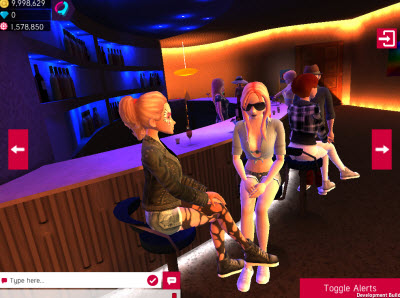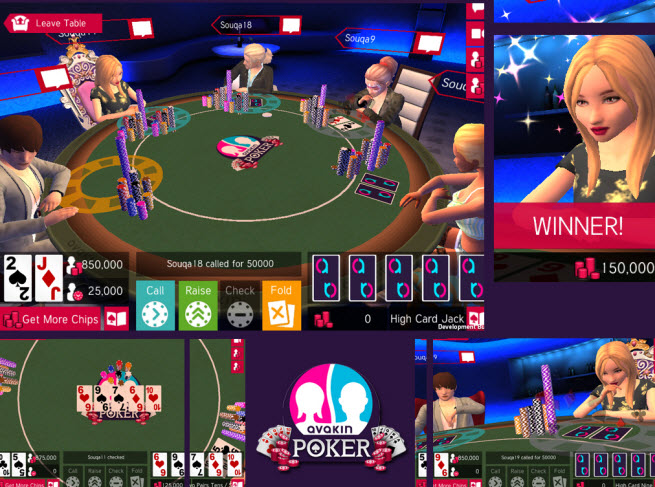Lockwood Publishing, a successful free-to-play publisher on Sony’s PlayStation Home virtual world, is expanding to mobile games today. The Nottingham, England-based studio is launching a new 3D avatar that exists across mobile games on a variety of platforms.

The company is rolling out the avatar for the first time in its own title, Avakin Poker, which debuts this spring on iOS, Android, and Web browsers. The 3D avatars allow players to create realistic human characters based on the Unity 3D game engine. The poker offering features 3D renders, and it will feel much more like you’re sitting at a poker table in Las Vegas, the company said.
“This reflects a big change in the game industry,” said Joel Kemp, Lockwood Publishing’s co-founder, in an interview with GamesBeat. “We have learned a lot through PlayStation Home and established a strong community there.”
Lockwood is famous for publishing games such as Sodium and Sodium 2 on PlayStation Home. The company pioneered free-to-play high-end releases on the Sony virtual world, and it continues to maintain those games on Home.
“We had great success with Sony, but this is what we have been doing over the last couple of years,” Kemp said.
Now, the organization is expanding into mobile using the cross-platform Unity technology. Similar to systems like Xbox Live Avatars and PlayStation Home, players can create a custom 3D avatar and use it across games. They can have a single XP inventory and a single account across multiple platforms. The poker game is the first of multiple releases that will use Avakin avatars. Players can log into the same account across different channels and play against the same people.
But in contrast to Xbox Live and PlayStation Home, Lockwood has focused its avatars on mobile devices, which haven’t been powerful enough in the past to run 3D avatars. Now, those options are catching up with the consoles, and the time is ripe for this change, Kemp said. Lockwood is considering licensing the Avakin technology to other mobile-game companies.
The avatars will enable player-versus-player competition across platforms in real-time. That’s not easy to do, and Lockwood believes it is the first to do that with 3D avatars (Jawfish Games is doing it with 2D games). Lockwood has created its own cloud-based backend service, which connects different systems. It uses off-the-shelf backend components like Smart Fox server, Edgecast, and Amazon EC2, along with its own software and its home-grown metrics system called Playmetrix. Lockwood will make Playmetrix available to third parties.
The company will release the Avakin technology in the United Kingdom first and tweak it based on consumer feedback. Then, Lockwood will launch it in the Latin American market through BoaCompra, a South American game publisher, this summer. The publisher is pursuing partnerships in other territories where free-to-play business models are big.
Lockwood started in 2005 on social platforms but got a game deal with Sony to work on Home titles. The self-funded firm primarily makes rich 3D games that serve as social multiplayer experiences. The company has more than 40 people working on multiple projects. Rivals include 3D avatar games such as PKR and platforms such as IMVU. Others include Stardoll and Habbo, but those offerings focus on younger audiences.
Kemp said the company will continue to work on console games for next-generation systems in the future. If mobile games one day run on consoles, Kemp says his company will be ready since the games will run on Unity, which should run across all platforms.
VentureBeat's mission is to be a digital town square for technical decision-makers to gain knowledge about transformative enterprise technology and transact. Learn More

